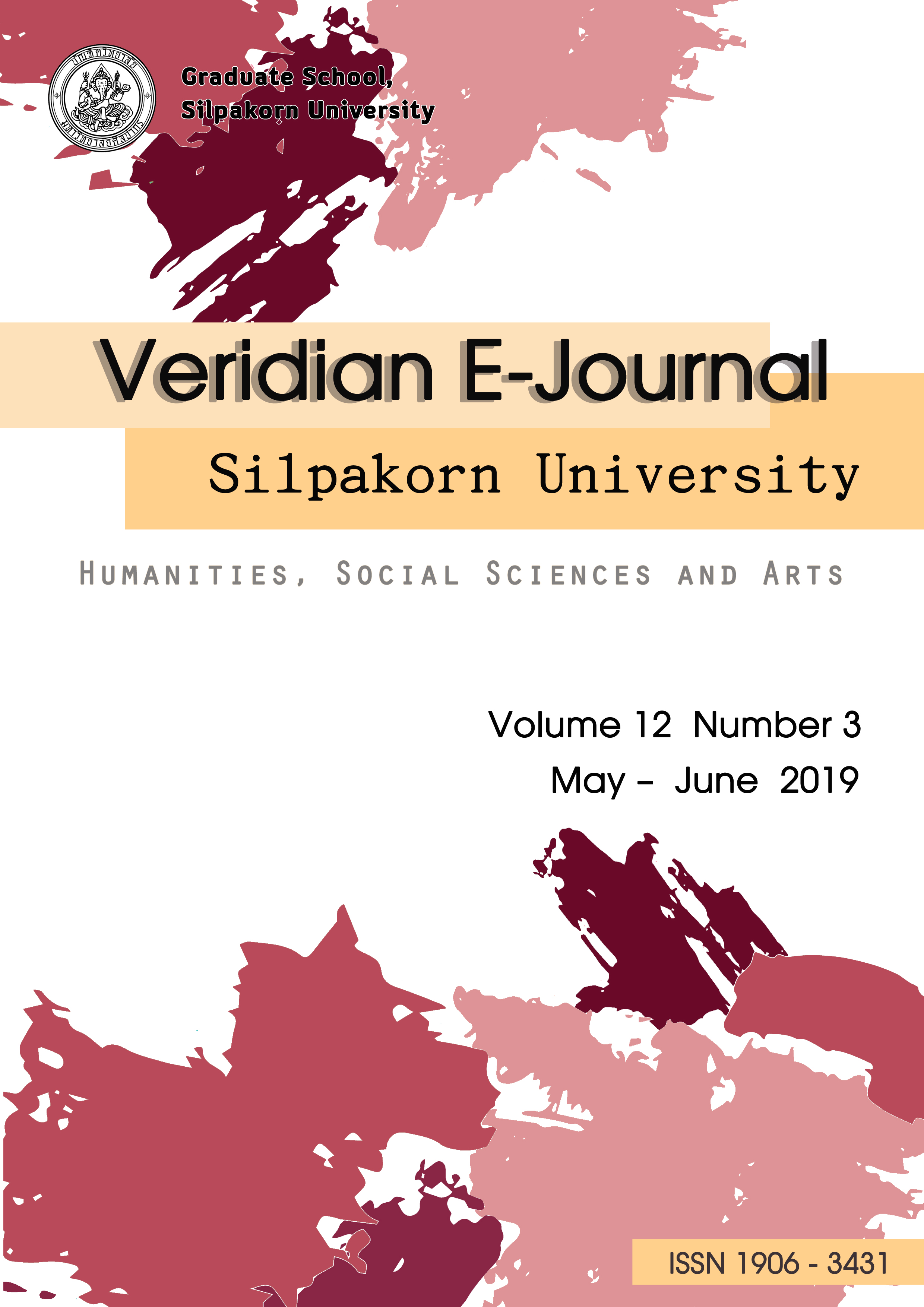ปัจจัยเชิงสาเหตุที่มีอิทธิพลต่อการสร้างคุณค่าในตราสินค้าร่วมกันของลูกค้า ผ่านแพลตฟอร์มโซเชียลคอมเมิร์ซ (Causal Factors Influencing Customer Brand Value Co-Creation through Social Commerce Platform)
Main Article Content
Abstract
การวิจัยครั้งนี้มีวัตถุประสงค์เพื่อศึกษาถึงปัจจัยเชิงสาเหตุที่มีอิทธิพลต่อการสร้างคุณค่าในตราสินค้าร่วมกันของลูกค้าผ่านแพลตฟอร์มโซเชียลคอมเมิร์ซ และรูปแบบความสัมพันธ์เชิงสาเหตุของปัจจัยที่มีอิทธิพลต่อการสร้างคุณค่าในตราสินค้าร่วมกันของลูกค้าผ่านแพลตฟอร์มโซเชียลคอมเมิร์ซ เครื่องมือที่ใช้ในงานวิจัย คือ แบบสอบถามซึ่งพัฒนามาจากการทบทวนวรรณกรรม และการตรวจสอบความเที่ยง โดยการทดสอบค่าสัมประสิทธิ์ ครอนบาคอัลฟ่า แบบสอบถามได้กระจายแก่กลุ่มตัวอย่างซึ่งเป็นผู้ที่มีประสบการณ์ในการใช้งานแพลตฟอร์มโซเชียลคอมเมิร์ซ จำนวน 230 คน จากนั้นทำการวิเคราะห์โมเดลการวัด และวิเคราะห์โมเดลสมการโครงสร้างก่อนการทำการตรวจสอบสมมติฐานด้วยวิธีการวิเคราะห์ข้อมูลสถิติแบบเส้นทางกำลังสองน้อยที่สุดบางส่วน (Partial Least Square: PLS)
ผลการวิจัยพบว่า ปัจจัยที่มีอิทธิพลต่อการสร้างคุณค่าในตราสินค้าร่วมกันของลูกค้ามากที่สุด คือ การแบ่งปันข้อมูลผ่านทางแพลตฟอร์มโซเชียลคอมเมิร์ซ รองลงมา คือ คุณภาพของความสัมพันธ์ ตามลำดับ โดยการแบ่งปันข้อมูลผ่านทางแพลตฟอร์มโซเชียลคอมเมิร์ซมีอิทธิพลทางตรงต่อการสร้างคุณค่าในตราสินค้าร่วมกันของลูกค้า (DE=0.407, P<0.01) คุณภาพของความสัมพันธ์ (DE=0.396, P<0.01) และการสนับสนุนทางสังคม (DE=0.128, P<0.05) และมีอิทธิพลทางอ้อมต่อการสร้างคุณค่าในตราสินค้าร่วมกันของลูกค้า (IE=0.107, P<0.05) ในขณะที่การสนับสนุนทางสังคมมีอิทธิพลทางตรงต่อคุณภาพของความสัมพันธ์ (DE=0.118, P<0.05) และคุณภาพของความสัมพันธ์ยังมีอิทธิพลทางตรงต่อการสร้างคุณค่าในตราสินค้าร่วมกันของลูกค้า (DE=0.277, P<0.01) และยังพบว่าการแบ่งปันข้อมูลผ่านทางแพลตฟอร์มโซเชียลคอมเมิร์ซไม่มีอิทธิพลทางตรงความกังวลเกี่ยวกับความเป็นส่วนตัว (DE=-0.085, P>0.05) โดยความกังวลเกี่ยวกับความเป็นส่วนตัวยังไม่มีอิทธิพลทางตรงต่อการสร้างคุณค่าในตราสินค้าร่วมกันของลูกค้า (DE=0.084, P>0.05) นอกจากนี้ การแบ่งปันข้อมูลผ่านทางแพลตฟอร์มโซเชียลคอมเมิร์ซไม่มีอิทธิพลทางอ้อมต่อคุณภาพของความสัมพันธ์ (IE=0.015, P>0.05) และการสนับสนุนทางสังคมไม่มีอิทธิพลทางอ้อมต่อการสร้างคุณค่าในตราสินค้าร่วมกันของลูกค้า (IE=-0.033, P>0.05) โมเดลสมการโครงสร้างสามารถอธิบายผลของการสร้างคุณค่าในตราสินค้าร่วมกันของลูกค้าผ่านแพลตฟอร์มโซเชียลคอมเมิร์ซ ได้ร้อยละ 34.10 (R2 = 0.341, R2adj = 0.333) จากผลการวิจัยเป็นประโยชน์ต่อผู้ประกอบการธุรกิจออนไลน์ผ่านแพลตฟอร์มโซเชียลคอมเมิร์ซ ในการเพิ่มระดับการสร้างคุณค่าในตราสินค้าร่วมกันของลูกค้า โดยผ่านคุณภาพของความสัมพันธ์ที่เกิดขึ้นจากการสนับสนุนทางสังคม และการแบ่งปันข้อมูลผ่านทางแพลตฟอร์มโซเชียลคอมเมิร์ซ
This research aims to study the factors that influence customer brand value co-creation through social commerce platform and a causal model in the customer brand value co-creation through social commerce platform. The tool, which is questionnaire and test the reliability by coefficient alpha. The questionnaire was distributed to 230 samples that have experience in social commerce platform. Then analysis the measurement model and structural equation modeling before hypotheses testing by Partial Least Square Structural Equation Modeling (PLS-SEM) with SmartPLS software.
The result showed that the most influential factor affecting customer brand value co-creation through social commerce platform is social commerce information sharing, followed by relationship quality, respectively. Social commerce information sharing had a statically significant direct effects on customer brand value co-creation (DE=0.407, P<0.01), relationship quality (DE=0.396, P<0.01) and social support (DE=0.128, P<0.05) and had a statically significant indirect effects on customer brand value co-creation (IE=0.107, P<0.05). While social support had a statically significant direct effects on relationship quality (DE=0.118, P<0.05) and relationship quality had a statically significant direct effects on customer brand value co-creation (DE=0.277, P<0.01). Moreover, found that social commerce information sharing hadn’t direct effects on privacy concern (DE=-0.085, P>0.05) and privacy concern hadn’t direct effects on customer brand value co-creation (DE=0.084, P>0.05). In addition, social commerce information sharing hadn’t indirect effects on customer brand value co-creation (IE=-0.015, P>0.05) and social support hadn’t indirect effects on customer brand value co-creation (IE=-0.033, P>0.05). The structural equation model can explain the effect to customer brand value co-creation through social commerce platform at 34.10 percent (R2=0.0.341, R2adj=0.333). The results of this research are beneficial to online business entrepreneurs through e-commerce on social media platform to increase customer brand value co-creation through the relationship quality by social support and social commerce information sharing.

